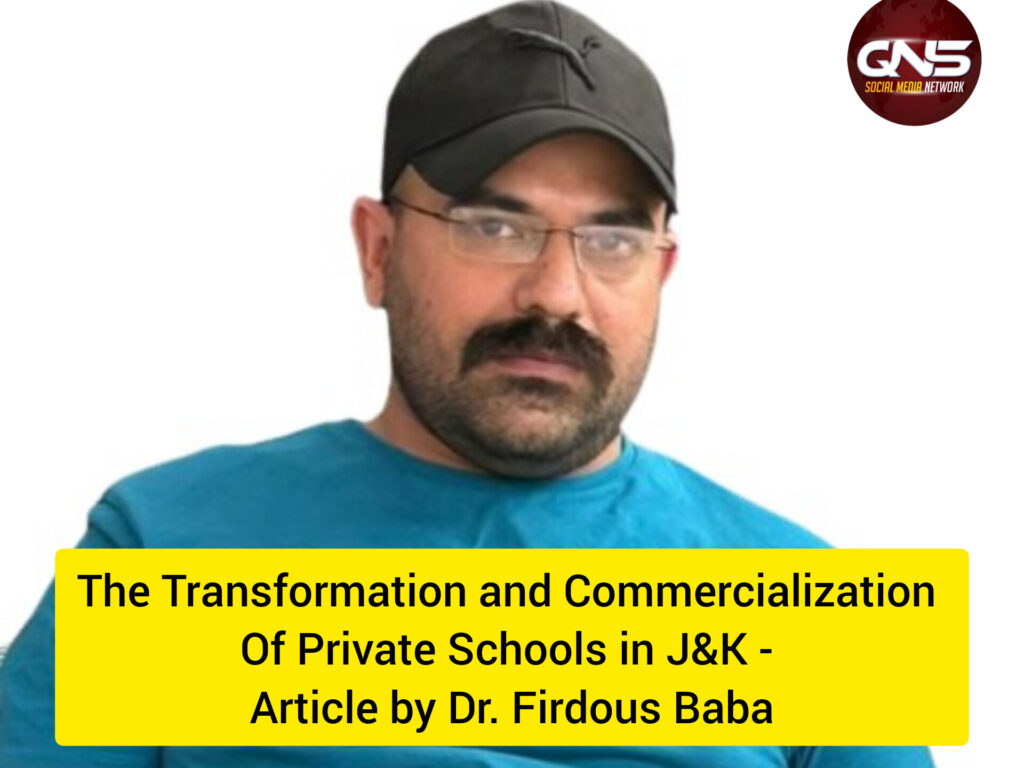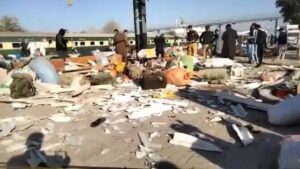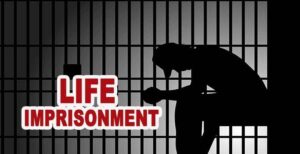The Transformation and Commercialization of Private Schools in J&K
Article by Dr. Firdous Baba
Srinagar, 09 July: According to the law of the land, private schools are not supposed to be commercial enterprises. In Jammu and Kashmir, these schools are designated as non-profit organizations, mandated to serve society.
However, the reality on the ground tells a different story, as private schools in the Kashmir Valley have increasingly become lucrative businesses. This shift has been driven by individuals with profit motives entering the education sector, thereby turning it into a commercial entity. As a result, economically disadvantaged families have suffered greatly. Currently, there are nearly 1.25 million students, from nursery to 10th grade, enrolled in private schools across the Kashmir Valley. The majority of these students come from modest backgrounds, with parents who are determined to provide the best possible education for their children. Unfortunately, private school owners have exploited this noble aspiration.
Many schools impose admission fees under various pretexts, with the most common tactic being to label these fees as “advance fees.” This clever maneuver helps them evade punitive measures from authorities who would otherwise penalize them for charging illegal admission fees.
Furthermore, numerous private schools disregard the guidelines set by the Fee Fixation and Regulation Committee (FFRC) by charging fees that far exceed the prescribed limits. Parents often feel powerless against these schools, which are adept at using their influence to suppress any dissent.
Additionally, almost all private schools charge annual fees, despite only a few having these fees regulated by the FFRC. Educational experts argue that annual fees are against legal norms, as court judgments have consistently ruled that charging beyond tuition fees is illegal. These annual fees often include charges for facilities such as libraries and laboratories, which are rarely utilized by young children, especially those in pre-nursery and nursery classes. The malpractices of private schools extend beyond excessive fees.
Many of these institutions operate as trusts, meaning the income generated should be reinvested in the school. However, school owners often circumvent this by fabricating loans. They claim to have borrowed money from family members and repay these loans using school funds, effectively diverting the income into their personal accounts. This practice exploits the charitable status of these schools, which are exempt from taxes. In addition, several private schools underreport the number of enrolled students and collect monthly fees in cash. This approach enables them to withdraw cash without scrutiny from the FFRC.
Some prominent schools include members from the judiciary, bureaucracy, and journalism on their boards, ensuring protection when faced with legal or regulatory challenges. The exploitation extends to private school teachers as well. School owners often maintain two sets of records: one for the labor commission, which shows inflated salaries, and another for internal use, which reflects the actual, lower salaries paid. Teachers receive their salaries in cash, avoiding bank transactions to prevent the labor commission from discovering the underpayment.
Land grabbing is another issue
Several missionary schools around Lal Chowk occupy government land. These schools collectively rent 214 Kanals of prime land, valued at approximately Rs. 3,250 Crores, for a nominal annual rent of Rs. 39,375. Despite this, they charge high fees and cater primarily to affluent families.
An insider from one of the missionary societies in Srinagar estimated that the annual revenue of these schools ranges between Rs. 450 to Rs. 500 Crores. The lease agreements stipulate that these schools must provide free education to 25% of their students in exchange for the land, but this requirement has been ignored.
Moreover, neither these schools nor any other private schools in the region are adhering to the National Education Policy (NEP) 2020, which mandates a 25% freeship quota for children from poor backgrounds. Many private schools have formed a cartel to resist the implementation of NEP 2020, as it would result in a substantial loss of income despite the government compensating for the free education.
The government of the Lieutenant Governor of Jammu and Kashmir must enforce NEP 2020 in its entirety. Additionally, an independent committee should be established to audit the finances and operations of prominent private school owners who are guilty of these widespread malpractices. Implementing these measures would help restore the integrity of private education in Jammu and Kashmir, ensuring that it serves society rather than exploiting it.
The Rise of Commercialization in Private Schools
Despite being mandated as non-profit organizations, private schools in Jammu and Kashmir have increasingly operated like commercial enterprises. This transformation has had a detrimental impact on the economically disadvantaged population, who struggle to afford the rising costs associated with private education.
There are about 1.25 million students, ranging from nursery to 10th grade, enrolled in private schools throughout the Kashmir Valley. Most of these students come from humble backgrounds, with parents who are determined to provide them with the best education possible. However, this desire is being exploited by private school owners, who impose various fees under different pretexts. One common tactic is to label admission fees as “advance fees,” allowing these schools to bypass penalties for charging illegal admission fees.
Additionally, many private schools do not adhere to the guidelines set by the Fee Fixation and Regulation Committee (FFRC). They charge fees that far exceed the prescribed limits, leaving parents feeling powerless against these institutions. Almost all private schools also charge annual fees, despite only a few having these fees regulated by the FFRC. Experts argue that annual fees go against legal norms, as court judgments have consistently ruled that charging beyond tuition fees is illegal.
These fees often include charges for facilities like libraries and laboratories, which are rarely used by young children, especially those in pre-nursery and nursery classes. The issue extends beyond excessive fees. Many private schools operate as trusts, meaning the income generated should be reinvested in the school. However, school owners often bypass this requirement by fabricating loans. They claim to have borrowed money from family members and repay these loans using school funds, effectively diverting the income into their personal accounts. This practice exploits the charitable status of these schools, which are exempt from taxes. Moreover, several private schools underreport the number of enrolled students and collect monthly fees in cash. This enables them to withdraw cash without scrutiny from the FFRC. Some prominent schools have board members from the judiciary, bureaucracy, and journalism, ensuring protection when faced with legal or regulatory challenges. The exploitation of private school teachers is another major issue. School owners often maintain two sets of records: one for the labor commission, which shows inflated salaries, and another for internal use, which reflects the actual, lower salaries paid. Teachers receive their salaries in cash, avoiding bank transactions to prevent the labor commission from discovering the underpayment.
Land Misuse and the Role of Missionary Schools
Land grabbing is another significant issue. Several missionary schools around Lal Chowk occupy government land. These schools collectively rent 214 Kanals of prime land, valued at approximately Rs. 3,250 Crores, for a nominal annual rent of Rs. 39,375. Despite this, they charge high fees and cater primarily to affluent families. An insider from one of the missionary societies in Srinagar estimated that the annual revenue of these schools ranges between Rs. 450 to Rs. 500 Crores. The lease agreements stipulate that these schools must provide free education to 25% of their students in exchange for the land, but this requirement has been ignored. Moreover, neither these schools nor any other private schools in the region are adhering to the National Education Policy (NEP) 2020, which mandates a 25% freeship quota for children from poor backgrounds. Many private schools have formed a cartel to resist the implementation of NEP 2020, as it would result in a substantial loss of income despite the government compensating for the free education. The government of the Lieutenant Governor of Jammu and Kashmir must enforce NEP 2020 in its entirety.
Additionally, an independent committee should be established to audit the finances and operations of prominent private school owners who are guilty of these widespread malpractices. Implementing these measures would help restore the integrity of private education in Jammu and Kashmir, ensuring that it serves society rather than exploiting it.
Further, the government must ensure that the posh and lucrative schools are not immune to government norms.
Whenever the government issues an order, it is enforced on low-budget and middle-budget schools with an iron fist by the education authorities, while the posh schools consistently find ways to evade compliance with government guidelines.
The Urgency of Implementing Reforms:
The commercialization of private schools in Jammu and Kashmir has reached a critical point. The laws designed to ensure these schools operate as non-profit organizations are being routinely flouted, leading to widespread exploitation of both parents and teachers. The situation demands immediate action from the government to restore integrity and fairness in the private education sector.
The NEP 2020 provides a comprehensive framework for educational reform, including provisions to ensure that children from poor backgrounds receive free education. However, the successful implementation of this policy requires strict enforcement and oversight. An independent audit of private school finances and operations would help identify and address the numerous violations currently taking place. The government must also take steps to protect the rights of private school teachers, ensuring they receive fair wages and benefits.
This would involve stricter monitoring of payroll practices and enforcement of labor laws. Additionally, addressing the misuse of government land by private schools would help ensure that public resources are used appropriately and for the benefit of society as a whole.
Furthermore, the role played by budget private schools has been significantly overlooked. Budget private schools have been crucial in meeting the educational needs of numerous children throughout the Valley, especially in underserved communities.
These institutions often serve families unable to afford the high fees of traditional private schools or lacking access to quality government education. They play a vital role in democratizing education and addressing gaps in educational access.
These schools have shown impressive resilience and innovation, adapting to local demands and offering affordable education without sacrificing quality. Their efforts in enhancing literacy rates and improving educational outcomes deserve recognition and should be further explored in public discussions.In conclusion, the current state of private schools in Jammu and Kashmir represents a significant departure from their intended role as non-profit organizations serving society.
The commercialization of education has led to numerous injustices, affecting parents, students, and teachers alike. It is imperative that the government takes decisive action to enforce existing laws, implement the NEP 2020, and conduct thorough audits of private school operations. Only through these measures can the integrity and fairness of the education system be restored, ensuring that it serves the best interests of all members of society.









